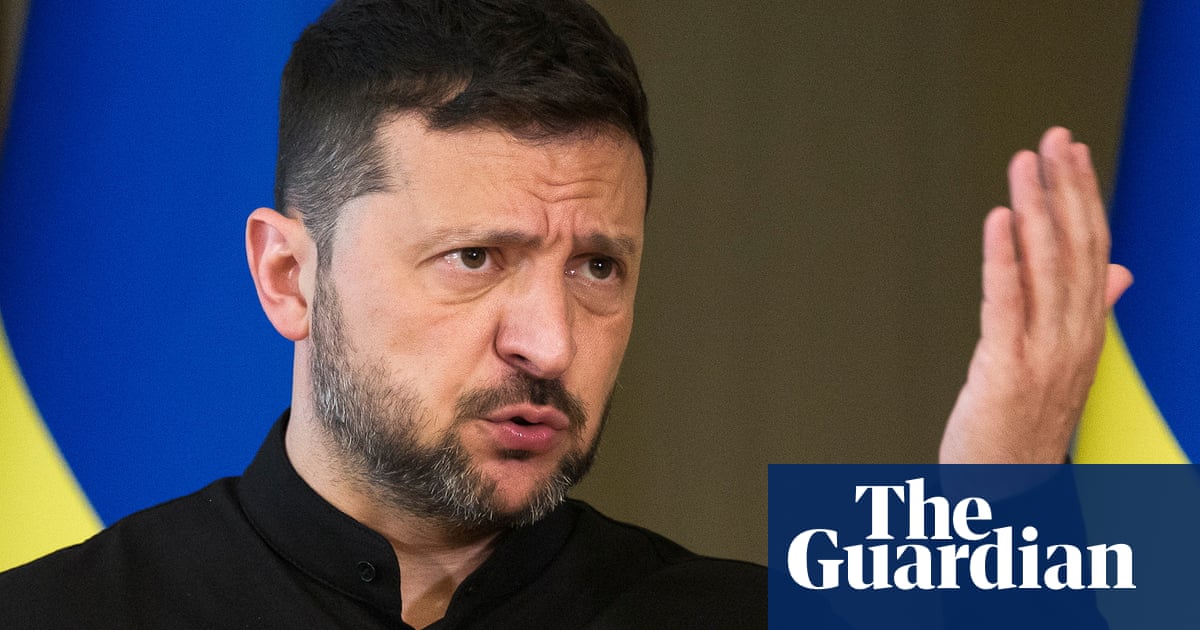Volodymyr Zelenskyy has doubled down on his promise to wait in Turkey on Thursday for face-to-face talks with Vladimir Putin, calling it a test of Russia’s willingness to pursue peace.
Speaking to journalists in Kyiv on Tuesday, Zelenskyy said he planned to wait for Putin in Ankara alongside the Turkish president, Recep Tayyip Erdoğan, adding that he would travel to Istanbul if Putin opted to hold the meeting there.
“If Putin does not arrive and plays games, it is the final point that he does not want to end the war,” the Ukrainian president said.
Over the weekend, Putin proposed direct talks with Ukraine in Istanbul,while dismissing demandsby Kyiv and its allies to agree to an immediate ceasefire by Monday or face further sanctions.
Washington has been pressingUkraineto attend the talks in Turkey, despite European calls for Russia to first agree to a month-long ceasefire.
The US president,Donald Trump, has not confirmed whether he will attend, though he hinted on Monday that he may travel to Turkey, a trip that would dramatically raise the status of the talks.
Zelenskyy said Trump had been invited to the talks because “it would give an additional push for Putin to fly in”.
Reuters later reported that Trump’s senior envoys, Steve Witkoff and Keith Kellogg, would travel to Istanbul.
Zelenskyy said he would “do everything to agree on a ceasefire, because it is with [Putin] that I must negotiate a ceasefire, as only he can decide on it”.
The Ukrainian leader urged the US to introduce its hardest-hitting package of sanctions if Putin rejected the call to meet inTurkey. “He [Putin] is afraid of direct negotiations with me,” Zelenskyy said.
The Kremlin declined on Tuesday to confirm whether Putin would attend the talks in Istanbul, but senior Russian lawmakers suggested this week that he was unlikely to travel and would instead send a high-level delegation.
“The Russian side continues to prepare for the negotiations,” the Kremlin spokesperson, Dmitry Peskov, told reporters on Tuesday morning.
When asked about the talks and Zelenskyy’s demand that the Russian president attend, Peskov said: “We are not going to comment any more yet.”
However, Moscow indicated it would pursue maximalist demands in Istanbul, similar to those made during the previous round of talks in Turkey in spring 2022.
Sergei Ryabkov, a senior foreign policy aide to Putin, said Russia intended to raise the issue of “denazifying the Kyiv regime” and addressing the “root causes” of the war – probably referring to a total halt to western military aid to Ukraine and full Russian control over the four Ukrainian regions it illegally annexed in 2022.
Putin and Zelenskyy have met only once, in 2019, and Moscow has repeatedly portrayed the Ukrainian leader as illegitimate.
European leaders offered a muted response on Tuesday morning as a 30-day ceasefire ultimatum they had backed expired without any agreement from the Kremlin. Over the weekend, the leaders of Britain, France, Germany and Polandjointly visited Kyivfor the first time to press their call for a ceasefire to begin on Monday, warning of severe consequences if Moscow failed to comply.
The German chancellor, Friedrich Merz, pressed again for an unconditional 30-day ceasefire as he met his Greek counterpart in Berlin on Tuesday.
“We are waiting for Putin’s agreement,” he said. “We agree that, in case there is no real progress this week, we then want to push at European level for a significant tightening of sanctions.”
Merz also backed Zelenskyy’s readiness to travel personally to Istanbul, “but now it is really up to Putin to accept this offer of negotiations and agree to a ceasefire. The ball is exclusively in Russia.”
